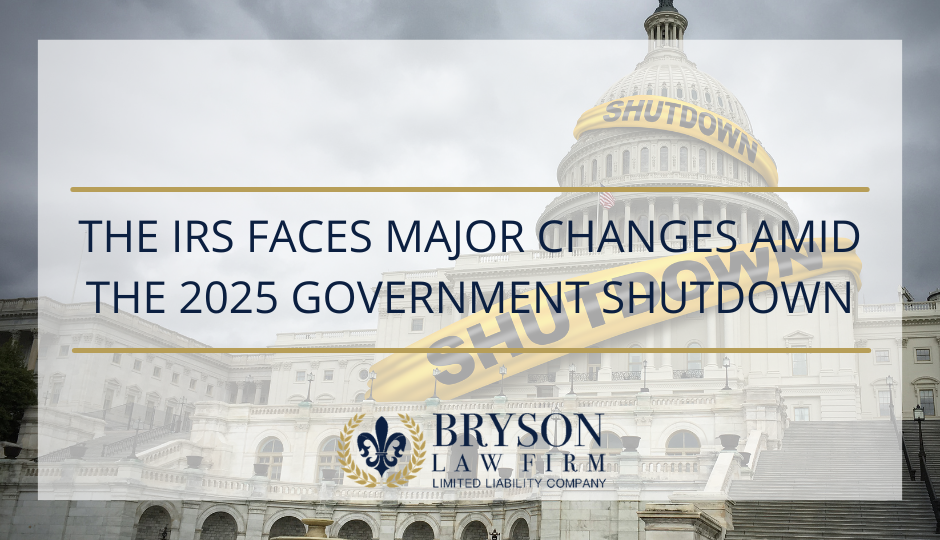
Reducing Your Tax Bill Through Penalty Abatement
Sometimes life gets in the way of paying your taxes, which could lead to you accruing a significant amount of IRS fines. However, if you can show you weren’t able to pay or file your taxes because of extenuating circumstances, Bryson Law Firm, L.L.C. may be able to reduce your tax bill through a legal procedure called Penalty Abatement.
Not all delinquent taxpayers are created equal. If you weren’t able to take care of your taxes through no fault of your own, we can work with the IRS to possibly lower your tax bill. But not everyone qualifies for Penalty Abatement. Remember, taxes are a legal issue, so you need an expert tax attorney to represent you. Bryson Law Firm, L.L.C. can gather all your pertinent information to establish a case to reduce or eliminate the penalties resulting from your tax bill.
A Myriad of Penalties
Did you know the IRS can assess over 140 different types of penalties? Some of the reasons you may be assessed penalties in the first place may be:
- Failure to file your tax return
- Failure to pay your taxes on time
- Failure to deposit certain taxes
Penalty Abatement is not available to everyone. For instance, Penalty Abatement doesn’t apply if you simply don’t have the money to pay your taxes. Or, you won’t be approved to have your penalties erased if you somehow forgot to file your taxes on time. However, the reason behind the non-payment or late filing may allow you to request the IRS to review your case. There has to be a reasonable cause for before the IRS will consider whether to reduce or eliminate the penalties from your tax bill.
If you were charged with a crime, you’re innocent until proven guilty. Tax penalties work the other way around. The IRS considers you guilty of late filing or non-payment until you can make the case that you shouldn’t be charged the penalties. Fortunately, the tax professionals at Bryson Law Firm, L.L.C. are experienced at compiling and presenting all the relevant documentation needed to establish reasonable cause for Penalty Abatement.
Reasons for Penalty Abatement
As we’ve said before, the IRS is not the cold-hearted agency that should be feared. They allow some flexibility with late filing or payment under certain circumstances. Here are some of the reasons for late filing or non-payment of your taxes which may qualify you for a reduction or elimination of your tax penalties:
Death, serious illness, or unavoidable absence
The IRS understands that life events, such as the death of a spouse or caring for a sick relative may cause the late filing or tax payment.
Unable to obtain records
This could happen for a variety of reasons. For instance, the company you worked for may go bankrupt, so you’re not able to get documentation for your income taxes.
Fire, casualty, natural disaster, or other disturbance
Natural disasters can create havoc on your life, your finances, and your financial records. Whether you’ve faced a hurricane, flood, wildfire, or another major event, you know how quickly everything can be turned upside down. For example, many Louisianans who lived through hurricanes like Katrina saw firsthand how a disaster can wipe out records and disrupt life for years. No matter where you live, recovering from that kind of loss can be a long and overwhelming process.
Bad advice from the IRS or tax service
Remember the Monopoly card that says, “Bank error in your favor, collect $75?” Sometimes the IRS can make an error in your favor, as well. If we can establish you received bad advice from either the IRS or the tax service you used to complete your taxes, we may be able to get your penalties abated.
Making Your Case for Penalty Abatement
At Bryson Law Firm, L.L.C., we take a systematic approach to request a Penalty Abatement for you. First, we gather all the particulars of the event surrounding your late filing or non-payment. We look at when the event occurred, what the circumstances were surrounding your situation, and what you did after the event. We then gather all the necessary documentation depending on your specific situation, such as hospital bills, a letter from your doctor, court records or documentation of a natural disaster.
The process for obtaining a Penalty Abatement can take a year or more, so there can be a lot of waiting to receive the IRS’ decision. Their rulings can be subjective, so if you’re turned down at first, we can pursue your case further by appealing the judgment.
Call Us First
The first step in applying for Penalty Abatement is to contact Bryson Law Firm, L.L.C. to set up your free initial consultation. Whether you’re in Louisiana, Texas, Alabama, or anywhere across the nation, one of our experienced tax attorneys can give you an honest assessment on whether pursuing Penalty Abatement is the best course of action in your case.























